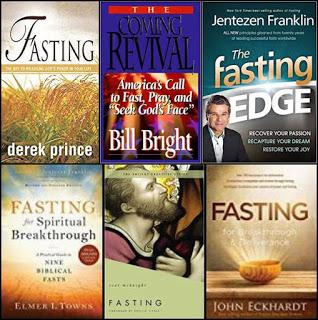Spiritual disciplines. We all know that they are. Reading the Bible. Praying. Giving. Attending church. Doing good works.
Fasting.
Fasting isn't talked about much and when it is, it's sort of either glossed over or it's folded in as part of the latest diet-fad-plan.
What IS the spiritual discipline of fasting, then?
Jesus said that we will be fasting as part of the spiritual life. In Matthew 6:16-18 He said what to do and what not to do when we do it.
And when you fast, do not look gloomy like the hypocrites, for they disfigure their faces that their fasting may be seen by others. Truly, I say to you, they have received their reward. 17 But when you fast, anoint your head and wash your face, 18 that your fasting may not be seen by others but by your Father who is in secret. And your Father who sees in secret will reward you.
If you haven't thought of fasting like this, please do: It's possible to fast in hypocrisy.
Just as with anything we do for the Lord, it's possible to mix in personal motives that outweigh or outbalance why we're doing it for Him, making it a hypocritical exercise. That's why it's important to know what fasting is and why we do it.

These books above are just a very few of the books that pop up when searching for "fasting". You can fast for breakthrough, to get an edge, to lose weight, to formulate atomic power with God, to feed your soul, to spark an awakening, to receive rewards, to cause a miracle, to start a revival...
Those are a few of the subtitles to the books that came up on my search for 'fasting.' If you're new to the faith or unfamiliar with the discipline, the dangers are real in that you might accidentally absorb the simply wrong or even heretical, written by heretics. They look good, they may sound good to the newbie, but they would steer you in the wrong direction.
Solid ministries that teach rightly would be John MacArthur at Grace to You, RC Sproul at Ligonier, CARM.org, Monergism, and more.
Here is a John MacArthur sermon about Fasting without Hypocrisy. The sermon begins this way:
Now fasting is a very popular phenomenon today, but that is not to be confused with what the Bible is teaching us about fasting.What DOES the Bible teach us about fasting? It is not to lose weight. It is not something to do for medical purposes, though your doctor may recommend fasting before taking certain tests. But that is not spiritual fasting. Spiritual fasting is not to "get" something. It is not to empty one's self in order to receive a revelation or to go mystical via dreams or visions in an altered state.
Biblical fasting has variously been defined as-
- Abstaining from food or drink in order to focus on prayer and seeking God's will.
- Abstaining from food for spiritual purposes.
- Abstaining from food for the purpose of focusing on God
The Bible never deals with fasting on a physical level. John MacArthur
Examples of fasts in the Bible:
Jesus fasted for forty days in the wilderness prior to beginning His public ministry. He was there to be tempted by the devil. (Matthew 4:1, Luke 4:1-2, Mark 1:13).
Nehemiah fasted in spiritual grief when he heard the state of Jerusalem. He fasted to confess the sins of Israel and gain permission to rebuild. (Nehemiah 1:4).
David fasted when his enemies were treating him unjustly (Psalm 35:13).
The Ninevites fasted after they heard Jonah's proclamation (Jonah 3:5) and all of them from greatest to least, fasted in repentance and humility, wearing sackcloth.
Acts 13:2 recounts the members of the early church ministering accompanied by fasting, to seek confirmation of elder appointments. (see Acts 14:23 also).
Paul fasted for three days after encountering Jesus on the road to Damascus. (Acts 9:9).
Fasting is always combined with prayer. Paul fasted often. (2 Corinthians 11:27). He could have been thinking of fasting in this verse:
But I discipline my body and keep it under control, lest after preaching to others I myself should be disqualified. (1 Corinthians 9:27).
So it seems from these examples and of course many others not listed here, that fasting is a regular spiritual activity for the Christian. One can fast for guidance, to gain spiritual strength, for clarity on a situation, to commune with God, to rectify a situation, to dispel self-sufficiency, to renew zeal (Mark 2:18-20), and other spiritual reasons, fasting is something that any Christian can and probably should do. Jesus seemed to say that it would be a regular activity, and gave directions for its proper implementation, though He did not command it. (Matthew 6:16-18).
I've fasted several times. I fasted for 3 days when I discovered a previous pastor had plagiarized all his sermons from other people and pretended they were his own. I needed God's guidance to determine what I should do and how to approach the situation, or with whom.
I fasted prior to approaching a Ladies' Minister who loved Beth Moore with my concerns about Beth Moore.
I fasted when our elders were planning and planting our new church.
I fasted on behalf of lifting a person to the Lord who was in a bad way.
All those were accompanied by prayer, too.
How do you deal with fasting? Have you done it? Do you enjoy it?
John MacArthur ends his sermon linked above this way:
God has given us every good thing to enjoy. Beloved enjoy it. But when you're in a spiritual struggle and you're consumed with the things of God, know this, that it's right to abstain from those things to continue your concentration and your focus on that which is spiritual and divine. God help us to be more sensitive so that fasting in its truest sense can be a part of our lives.
